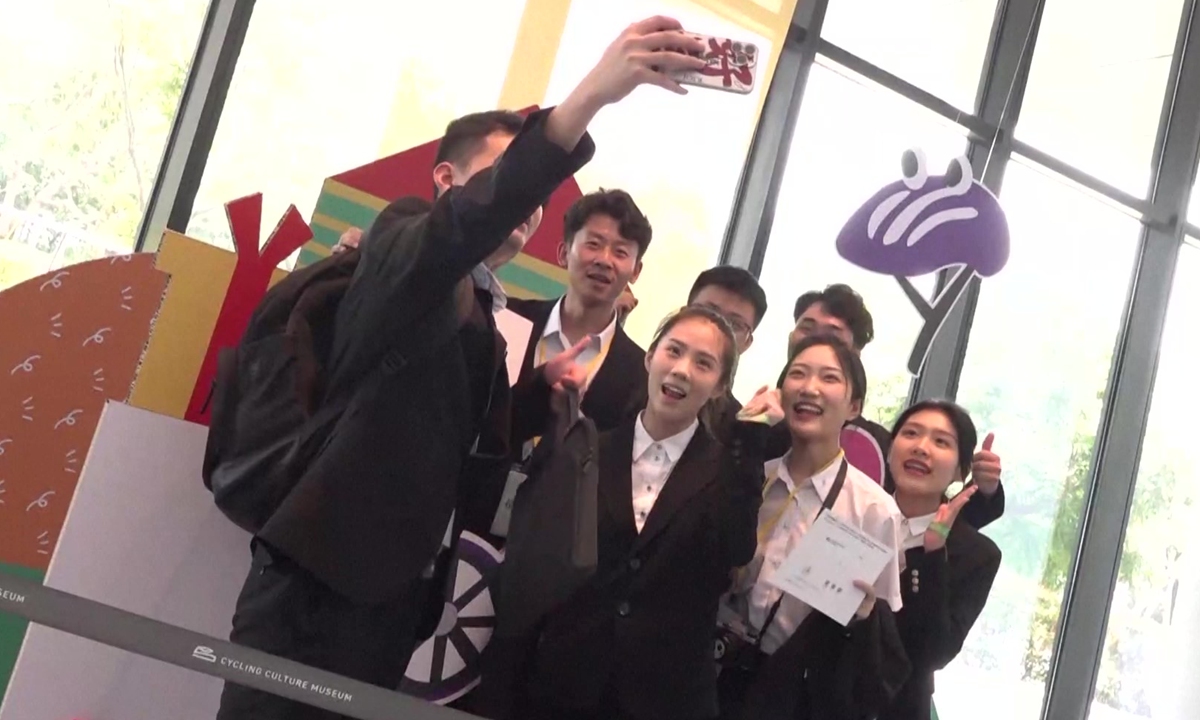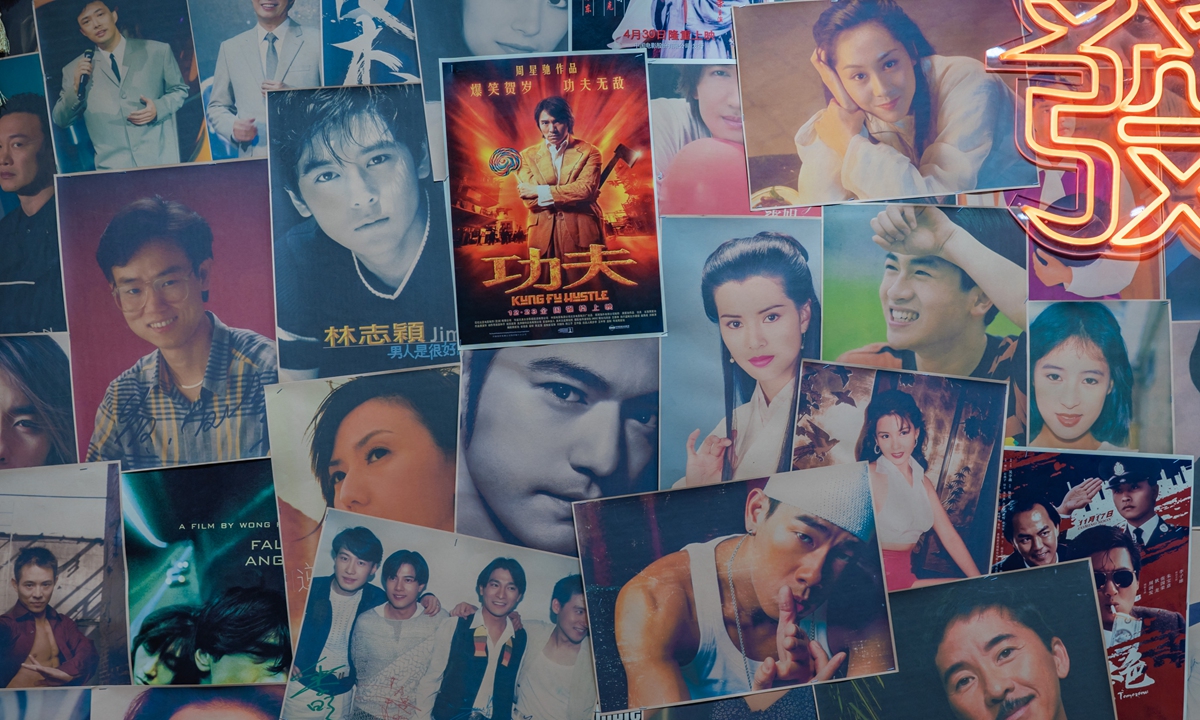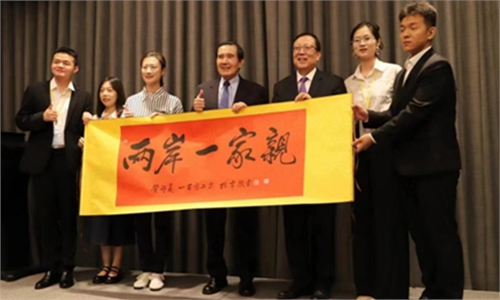IN-DEPTH / IN-DEPTH
Mainland apps trend in island of Taiwan, underlining deep-rooted cultural, lifestyle bond
Cross-Straits resonance

Chinese mainland university students on a visit to the island of Taiwan pose for a group photo on July 16, 2023. Photo: VCG
No matter whether it was the secessionist force or the novel coronavirus, knots between young people in the Chinese mainland and the island of Taiwan have never been cut off.
In the 1980s, it was icons from the island of Taiwan's popular culture, like the boy band The Little Tigers and the Elvis-like Fei Xiang, who captured the hearts of countless mainland fans. The millennial generation grew up listening to songs by Jay Chou and Mayday, and watching TV series like the "Princess Returning Pearl," which were collaborations between both sides of the Straits. Today, with increased cross-Straits exchanges and advanced internet connectivity, Generation Zers are learning about each other through more diverse avenues.
According to media reports, from 2019 to 2022, Douyin (TikTok) and Xiaohongshu (Little Red Book) became some of the most popular apps in Taiwan island's mobile app stores. Many young people from the island have picked up on the latest memes shared by their peers on the mainland.
Moreover, post-pandemic recovery has facilitated exchanges and cross-Straits visits among young people, allowing them to genuinely understand and experience each other's customs and traditions.
Despite warnings and resistance from separatist forces on the island, the young generation of the island today is willingly and spontaneously engaging with simplified Chinese characters, traditional culture, and mainland lifestyle through social media apps like Xiaohongshu and Douyin.
The underlying essence behind this lies in the strong sense of identity that flows through their veins, enabling young people from both sides to come together and connect across the Straits through online platforms.

Photo: VCG
'Xiaohongshu generation'
Before setting off, Sun Chiao-hsuan did some fact finding on Xiaohongshu and Douyin, learning about scenic spots to visit, local snacks to try, and gifts and trinkets to buy for family and friends.
Sun, a postgraduate student from the political science department of Chinese Culture University in the island of Taiwan, took part in a national summer camp in early July, and a trip to Beijing and Tianjin.
"On Douyin, people all say that children in Tianjin can play allegro after they are born, which I think sounds very interesting," Sun said.
After thorough research, she decided to pick dim-sum bought in Beijing's famous dessert shop Fuhuazhai as the perfect gift before returning to the island.
Sun said that half of her friends in the island of Taiwan use mainland applications on a daily basis.
She particularly uses mainland apps such as Xiaohongshu, Douyin, and Bilibili, and has follows many content creators on said platforms. Some of her favorite channels include Caishuxueqian, a hardcore handcraft vlogger, and Moyun, a music vlogger who plays zithers.
"I was impressed by a video uploaded by Caishuxueqian, in which the content creator creates a replica of a golden mask that was previously uncovered in the Sanxingdui Ruins in Southwest China's Sichuan Province. That was really impressive," she said.
Huang Chien-chia, who is in his second year of a master's degree at the Hwa Hsia University of Technology in the island, told the Global Times that he is a fan of browsing through Chinese mainland social media apps a lot.
"On Douyin, I usually consume travel video content from which I get tips while preparing to travel to the mainland. I also follow and learn from some handmade videos on Xiaohongshu with my girlfriend, on how to create handicrafts such as wool knitwear," he said.
Far from this being the preserve of college students in the island of Taiwan, Chinese mainland apps enjoy popularity among other demographics including many younger students in elementary and high school, who have become seasoned users.
According to a survey on internet social communities released by the Taiwan Fund for Children and Family in May, despite suppression attempts by Democratic Progressive Party (DPP) authorities, multiple Chinese mainland social networking apps have made it into the top ten favorite social apps used by children and teenagers in the island.
During the "Sunflower Movement" period, the DPP continually expanded its influence and defined the island's younger generation as a generation that was "naturally pro-independence." However, with time, the post-95, post-00, and post-05 generations in the island have demonstrated different perspectives.
According to a report by the Taipei-based China Times on July 10, over 65 percent of users from the island of Taiwan who downloaded Xiaohongshu from the Google Play Store were female, with the highest user percentage seen among those aged between 18 and 24.
The China Times, which has been closely following the trend, pointed out in a 2021 article that the younger generation in the island of Taiwan, previously labeled as "naturally pro-independence," has shown a potential pro-reunification inclination under the influence of the Chinese mainland's rising soft power. This emerging group is even referred to as the "Xiaohongshu Generation."

Photo: VCG
Breaking information bubbleRecently, there have been heated discussions on the island's PTT forum about local young people's love for Xiaohongshu and Douyin. A high school student stated, "The mainland I see through Xiaohongshu and Douyin is completely different from what the older generation talks about." This remark turned the PTT forum into a battleground, with over a thousand comments within six hours, leading to intense debates from all sides.
Analysts have noted that through apps such as Xiaohongshu, the island's young generation has been exposed to a more approachable, concrete, and relatable image of the Chinese mainland, which has, to some extent, influenced their perception of the mainland.
However, the DPP is indeed employing the concept of "cognitive warfare" to suppress mainland apps that are popular in the island.
In December 2022, the island's newly established digital development "department," which had been in operation for less than six months, announced a strict ban on the use of mainland apps such as Douyin and Xiaohongshu by "government" agencies in the island.
Some DPP authorities also accused the Chinese mainland of using social media platforms to "infiltrate young people" in the island of Taiwan and engage in "cognitive warfare" against the island.
As spokesperson Zhu Fenglian of the Chinese mainland's Taiwan Affairs Office pointed out, many young people in the island of Taiwan enjoy using mainland apps like Xiaohongshu and Douyin because of their user-friendliness and entertainment value. In a way, these apps contribute to improving their quality of life and overall happiness.
"The politicians from the DPP, with their grandiose claims, only demonstrate their proficiency in political maneuvering while having drifted far from the lives of the people in the island and abandoning their interests and well-being," she said.
The estrangement between the Chinese mainland and the island of Taiwan, due to the antagonism and confrontation created by secessionist forces in the island by disseminating false information to residents in the island, made people across the Straits misunderstand each other, said Yang Yizhou, vice president of the All-China Federation of Taiwan Compatriots.
"Nowadays, these misunderstandings are gradually being unraveled in the face of modern technology as Douyin and Xiaohongshu are becoming effective communication tools for youngsters in the island of Taiwan to understand the mainland," Yang said.
The underlying cause of the popularity of mainland apps on the island of Taiwan is that both sides of the Straits live in the same Chinese cultural sphere. Residents of the two sides share similar life experiences and lifestyles, and it is easy for them to grow closer and find resonance with the other side, Yang told the Global Times.
If young people in the island of Taiwan were to continue being trapped in an information bubble within the island, it would be very terrible, as false narratives will cause increased confrontation and hostility between the two sides.
He said that exchanges among residents of the Chinese mainland and those of the island of Taiwan should be further encouraged, hoping that more youngsters can come and visit the mainland more frequently.
Increasing offline exchanges
The recent visit of a delegation from top Chinese mainland universities by faculty and students to the island of Taiwan has drawn media attention on both sides of the Straits.
According to reports, a group of 37 faculty and students from five mainland universities - Peking University, Tsinghua University, Fudan University, Wuhan University, and Hunan University - arrived at Taiwan's Taoyuan International Airport on the July 15, commencing their exchange and visit program.
On the same evening, former chairperson of the Chinese Kuomintang Ma Ying-jeou hosted a banquet to welcome the youth delegation from the five mainland universities, and he had a meeting with the delegation led by Peking University's Party Secretary, Hao Ping.
Ma expressed that the successful visit by the mainland students was the most significant cross-Straits youth exchange activity in recent years and the best birthday gift for him at the age of 73. This marks the first time in over three years that a group of Chinese mainland universities have visited the island for exchanges, which holds positive implications for the promotion of the restoration of bilateral exchanges between both sides.
Ding Ning, an Olympic champion and member of the visiting delegation expressed her eagerness at interacting with her peers from Taiwan, particularly those in sports. Besides the well-known pineapple cakes, she expressed her love for pastries like glutinous rice and mochi.
Ding served as the delegation team leader and quickly bonded with young people from both sides of the Straits. During a bus tour, she also shared various interesting anecdotes about playing sports around the world.
In early July this year, an offline Youth Summer Camp organized by the All-China Federation of Taiwan Compatriots was also launched in Beijing to improve exchanges between over 1,000 youth from the Chinese mainland and island of Taiwan, and encourage students from Taiwan to witness the new changes and achievements that have been made in the economic and social fields during their trip to the Chinese mainland.
Moreover, since 2004, more than 20,000 youth from the island of Taiwan have participated in these summer camp activities, making it one of the key projects in cross-Straits youth exchanges.
In July and August this year, related summer camp activities will be held in 28 provinces, autonomous regions, and municipalities on the mainland, as well as the Hong Kong and Macao special administrative regions and overseas regions.
"The re-opening of this summer camp offline after the epidemic has provided young people on both sides an opportunity to sit down and talk about their ideals, and jointly discuss the realities and problems we are facing now," Yang said. "I think the youth exchange between the two sides is a very good beginning and also provides a very good foundation for our future exchanges between the Chinese mainland and the island of Taiwan."


